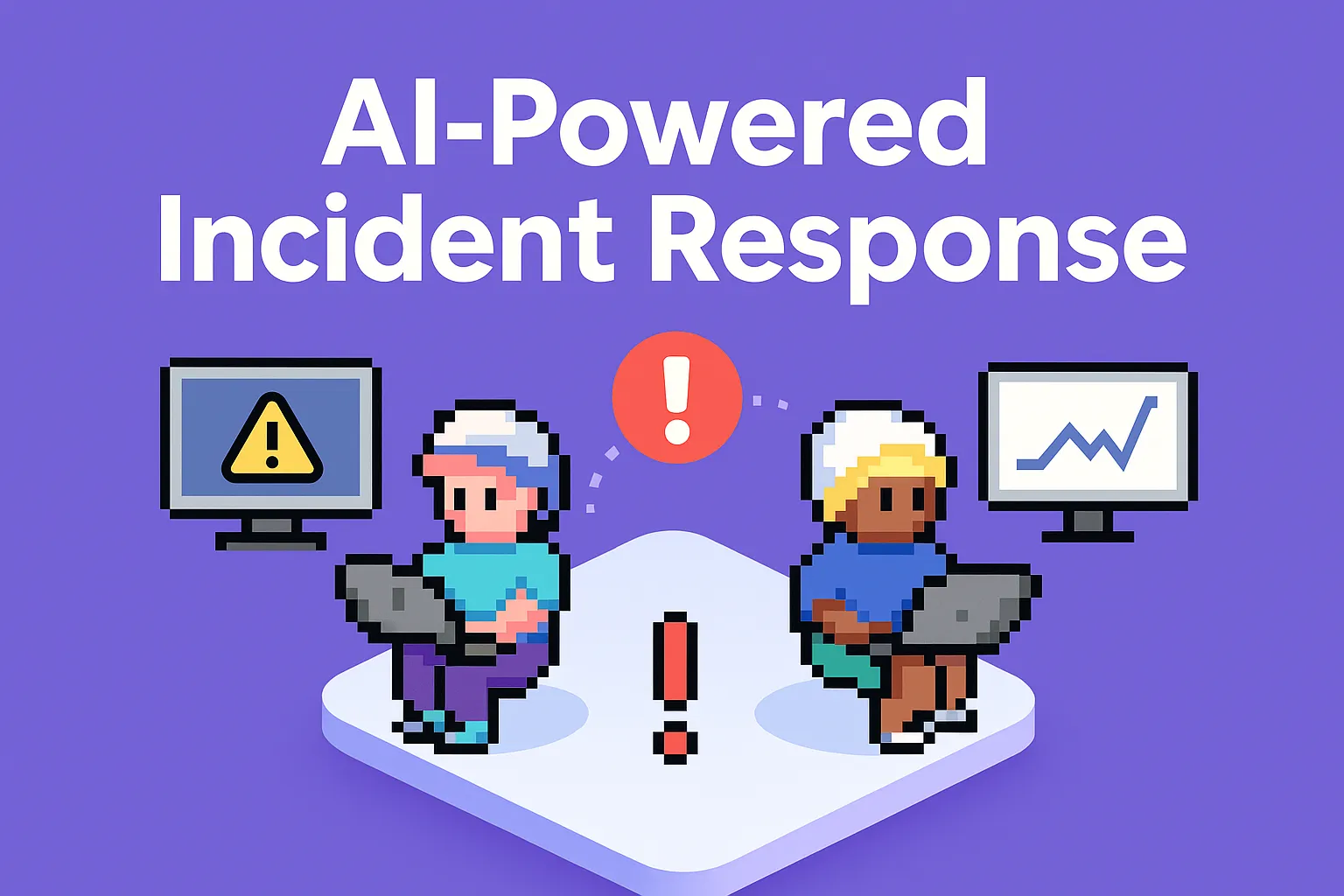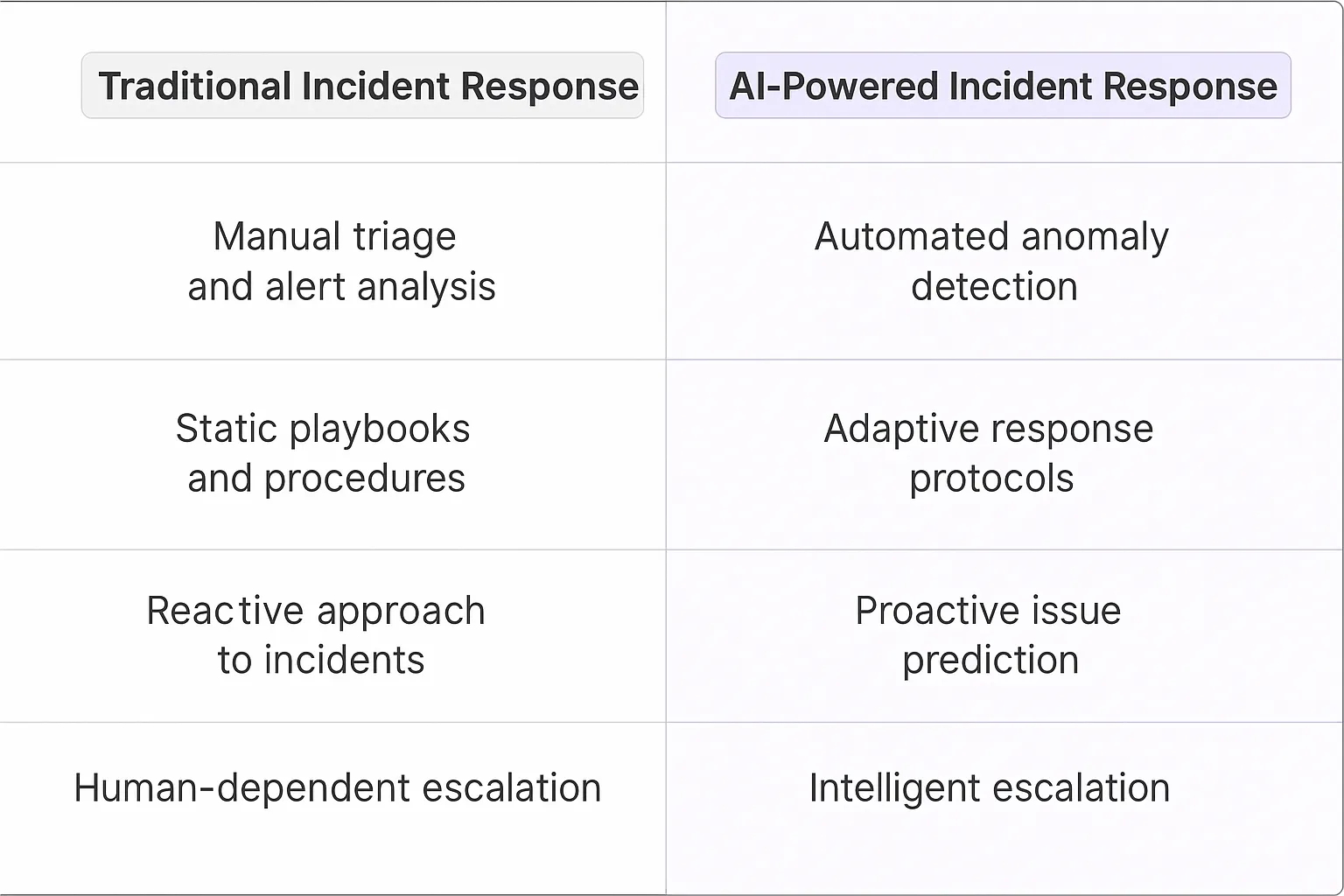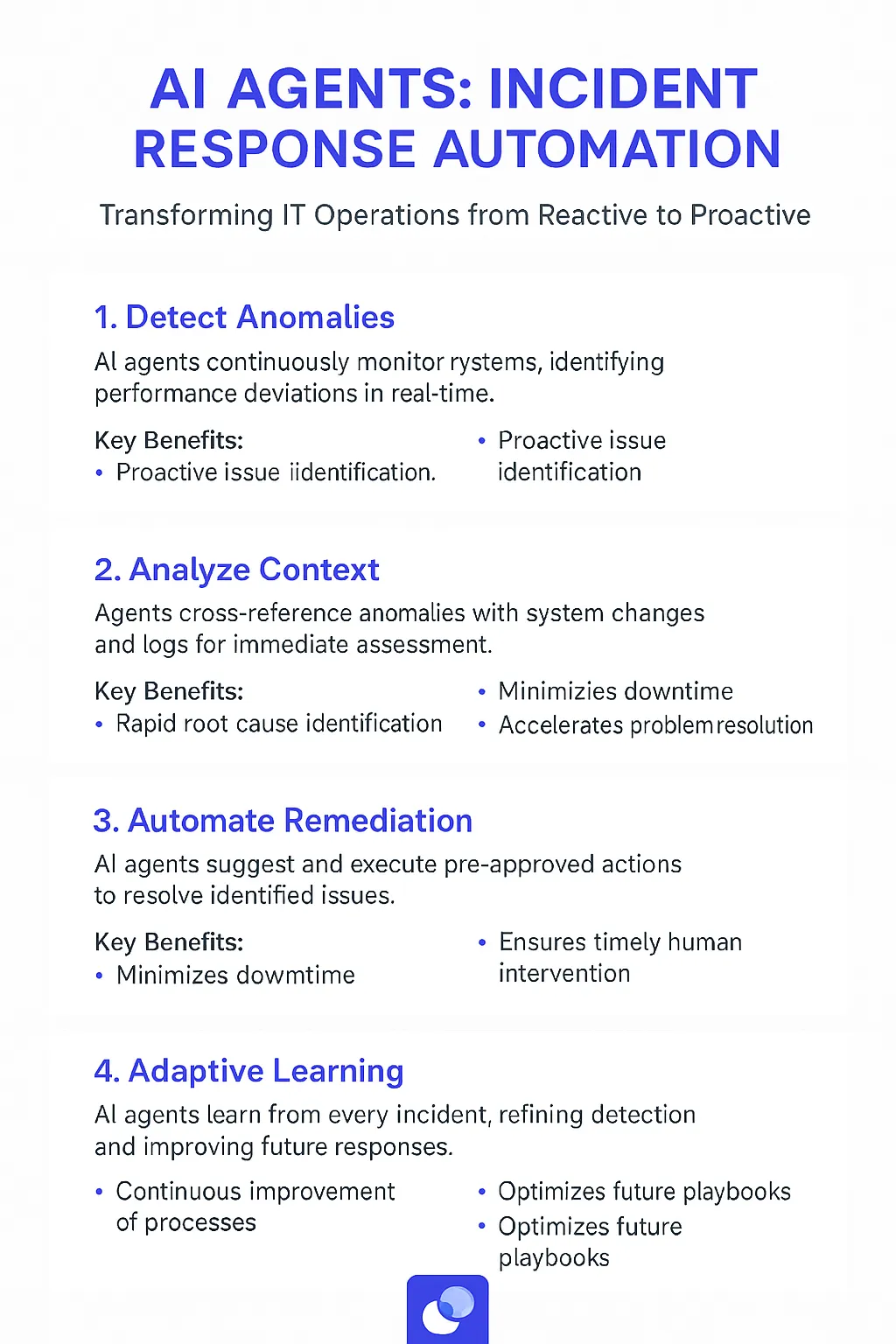Incident Response Automation AI Agents
The Power of AI-Driven Incident Response
What is Incident Response Automation?
Incident Response Automation is the process of using technology to streamline and accelerate the detection, analysis, and resolution of IT incidents. It's like having a digital first responder that never sleeps, constantly monitoring your systems for anomalies and initiating predefined response protocols the moment something goes awry. This approach dramatically reduces the time between incident detection and resolution, minimizing downtime and its associated costs.
Key Features of Incident Response Automation
The integration of AI Agents takes Incident Response Automation to the next level. These digital teammates bring a suite of game-changing capabilities:1. Real-time anomaly detection: AI Agents can spot patterns and deviations that would be invisible to human observers.2. Contextual analysis: They don't just identify problems; they understand them in the context of your entire system.3. Adaptive response: AI Agents learn from each incident, continuously improving their response strategies.4. Predictive capabilities: By analyzing historical data, they can often prevent issues before they occur.5. Intelligent escalation: When human intervention is needed, AI Agents ensure the right experts are looped in with the right information.This potent combination of features is redefining what's possible in incident management, enabling organizations to build more resilient, self-healing systems that can keep pace with the complexity of modern IT environments.

Benefits of AI Agents for Incident Response Automation
What would have been used before AI Agents?
Before AI agents entered the scene, incident response was a high-stress game of whack-a-mole. Teams relied on static playbooks, manual triage, and the heroic efforts of on-call engineers. It was like trying to put out fires with a water gun – you might get lucky, but you're mostly just exhausted and overwhelmed.
The old way involved endless Slack pings, war room conference calls, and bleary-eyed engineers staring at dashboards at 3 AM. It was a recipe for burnout, missed alerts, and costly downtime. Companies threw bodies at the problem, hoping that more humans could somehow keep up with the exponential growth of infrastructure and potential failure points.
What are the benefits of AI Agents?
Enter AI agents for incident response automation. These digital teammates are like having a team of elite Navy SEALs on standby 24/7, ready to parachute into any crisis. They bring superhuman speed, precision, and learning capabilities to the table.
First off, AI agents crush the initial triage phase. They can ingest and analyze vast amounts of system data, logs, and alerts in seconds, spotting patterns and anomalies that would take human teams hours or days to uncover. This rapid diagnosis means faster time-to-resolution and less downtime.
But it's not just about speed. These AI agents are learning machines, constantly improving their response playbooks based on each incident. They're building an institutional memory that doesn't clock out or change jobs. This means your incident response capability is always leveling up, becoming more sophisticated with each fire drill.
Another game-changing benefit is the reduction of alert fatigue. AI agents can filter out the noise, escalating only the truly critical issues that require human intervention. This means your human experts can focus their energy on complex, high-impact problems instead of getting bogged down in false alarms.
Perhaps most importantly, AI agents enable a proactive approach to incident management. By continuously monitoring system health and performance metrics, they can often predict and prevent issues before they escalate into full-blown crises. It's like having a weather forecaster for your tech stack, giving you time to batten down the hatches before the storm hits.
The end result? Dramatically reduced mean time to resolution (MTTR), improved system reliability, and a dev team that can actually sleep through the night. It's not just about keeping the lights on – it's about building a more resilient, self-healing infrastructure that can scale with your ambitions.

Potential Use Cases of AI Agents with Incident Response Automation
Processes
Incident response automation is ripe for AI-powered enhancement. These digital teammates can transform how teams handle critical events, making the process faster, more accurate, and less stressful. Here's how AI agents could revolutionize incident response:
- Automated Triage: AI agents can instantly categorize and prioritize incoming alerts, ensuring that critical issues get immediate attention.
- Contextual Analysis: By analyzing historical data and current system states, AI can provide rich context for each incident, helping responders understand the full picture quickly.
- Predictive Incident Detection: Advanced AI models can identify patterns that precede incidents, potentially flagging issues before they become critical.
- Dynamic Playbook Execution: AI agents can adapt standard playbooks on the fly, tailoring the response to the specific nuances of each incident.
- Cross-team Coordination: AI can facilitate seamless communication between different teams, ensuring everyone is on the same page during a crisis.
Tasks
Breaking down the incident response process, AI agents can take on numerous tasks that traditionally required human intervention:
- Initial Assessment: Analyzing alert data to determine the severity and potential impact of an incident.
- Resource Allocation: Automatically assigning the right personnel and tools based on the incident type and severity.
- Data Gathering: Collecting relevant logs, metrics, and system information to support the investigation.
- Root Cause Analysis: Using machine learning to identify the underlying causes of incidents more quickly and accurately.
- Remediation Suggestions: Proposing potential fixes based on historical data and best practices.
- Stakeholder Communication: Drafting and sending updates to affected parties, keeping everyone informed throughout the incident lifecycle.
- Post-Incident Review: Analyzing the response process to identify areas for improvement and update playbooks accordingly.
The integration of AI agents into incident response automation isn't just an incremental improvement—it's a paradigm shift. These digital teammates can process vast amounts of data in seconds, spot patterns humans might miss, and provide 24/7 vigilance. They're not replacing human expertise, but rather augmenting it, allowing teams to respond faster and more effectively to critical incidents.
As incidents become more complex and systems more interconnected, the role of AI in incident response will only grow. Forward-thinking organizations are already exploring how to leverage these capabilities to build more resilient systems and processes. The future of incident response is here, and it's powered by AI.

Industry Use Cases
AI agents are reshaping incident response automation across sectors, offering tailored solutions that adapt to each industry's unique challenges. These digital teammates aren't just tools; they're game-changers that elevate how organizations handle crises and maintain operational continuity. Let's dive into some concrete examples that illustrate how AI is transforming incident management in different fields, showcasing the tangible benefits and innovative approaches that are setting new standards in emergency preparedness and response.
Fintech's New Frontier: AI-Powered Incident Response
The fintech industry is ripe for disruption with AI-powered incident response automation. Let's dive into how this could reshape the landscape of financial services.
Consider a major online payment platform. Every second, millions of transactions flow through their systems. When an anomaly strikes - be it a potential security breach, a sudden spike in declined transactions, or an unexpected system outage - the clock starts ticking. Traditional incident response relies heavily on human intervention, often leading to delays and inconsistencies.
Enter AI-driven incident response agents. These digital teammates are always on, constantly monitoring the pulse of the system. They can detect patterns invisible to the human eye, correlating data from multiple sources in real-time.
When an incident occurs, these AI agents spring into action. They can:
- Instantly classify the severity of the incident based on historical data and current impact
- Automatically initiate predefined response protocols
- Notify relevant team members with contextualized information
- Begin preliminary diagnostic steps and data gathering
- Suggest potential solutions based on similar past incidents
The result? Dramatically reduced mean time to resolution (MTTR). In an industry where every minute of downtime can cost millions, this is a game-changer.
But it's not just about speed. These AI agents learn from each incident, continuously improving their response strategies. They can identify recurring issues, suggest proactive measures, and even predict potential future incidents based on subtle system behaviors.
For fintech companies, this level of incident response automation isn't just an operational improvement - it's a competitive advantage. It allows them to scale their operations more efficiently, maintain higher system reliability, and ultimately, build greater trust with their users.
As we move towards an increasingly digital financial ecosystem, the companies that can leverage AI to ensure rock-solid reliability will be the ones that thrive. Incident response automation is more than just a tool - it's the new standard for operational excellence in fintech.
AI-Powered Incident Response: Transforming E-commerce Operations
E-commerce is a high-stakes game where every second of downtime translates to lost revenue and frustrated customers. The industry's reliance on complex, interconnected systems makes it particularly vulnerable to incidents that can spiral out of control if not addressed swiftly and effectively.
Take a major e-commerce platform like Amazon or Shopify. These giants process thousands of transactions per minute, manage vast inventories, and coordinate intricate logistics networks. When something goes wrong - be it a payment processing glitch, a inventory sync error, or a shipping API failure - the ripple effects can be catastrophic.
This is where AI-driven incident response agents are changing the game. These digital teammates are reshaping how e-commerce platforms handle crises, turning potential disasters into minor hiccups.
Here's how these AI agents elevate incident response in e-commerce:
- Predictive Analysis: By continuously monitoring system metrics, user behavior, and external factors (like holiday shopping trends), AI agents can anticipate potential issues before they occur. They might detect an unusual surge in traffic and automatically scale resources to prevent a crash.
- Rapid Triage: When an incident does occur, AI agents can instantly assess its severity and impact. They can determine if it's a localized issue affecting a single product category or a systemic problem threatening the entire platform.
- Automated Mitigation: For known issues, AI agents can implement fixes without human intervention. If there's a sudden spike in failed payments from a specific payment gateway, the AI could automatically route transactions through alternative providers.
- Intelligent Escalation: When human intervention is necessary, AI agents ensure the right people are notified with the right information. They can provide a detailed incident brief, including potential causes and recommended actions, allowing human experts to hit the ground running.
- Continuous Learning: Each incident becomes a learning opportunity. AI agents analyze the effectiveness of response strategies, refining their approach for future incidents. They can identify recurring issues and suggest proactive measures to prevent them.
The impact of this AI-powered approach is profound. E-commerce platforms can maintain near-constant uptime, even during peak shopping seasons. They can respond to issues in seconds rather than minutes or hours, often resolving problems before customers even notice.
But the benefits extend beyond just firefighting. These AI agents are becoming central to operational strategy. They're providing insights that drive infrastructure decisions, informing product development, and even shaping customer service policies.
For e-commerce businesses, adopting AI-driven incident response isn't just about staying competitive - it's about setting a new standard for reliability and customer experience. As these systems become more sophisticated, we'll likely see a widening gap between companies that embrace this technology and those that don't.
The e-commerce landscape is evolving, and AI-powered incident response is at the forefront of this transformation. It's not just changing how we handle problems - it's redefining what's possible in online retail.
Considerations for Implementing Incident Response Automation AI Agents
Technical Challenges
Implementing an incident response automation AI agent isn't just about plugging in some fancy tech and calling it a day. It's a complex dance of algorithms, data, and infrastructure that requires careful choreography.
First off, you're dealing with the challenge of real-time data processing. Your AI agent needs to ingest, analyze, and act on a firehose of information faster than a caffeinated day trader. This means building robust data pipelines that can handle high-velocity, high-volume data without breaking a sweat.
Then there's the issue of false positives. Your AI agent needs to be smart enough to distinguish between a minor hiccup and a full-blown crisis. Too sensitive, and you'll have your team chasing shadows. Too lax, and you might miss the next big breach. Finding that sweet spot is like trying to nail jello to a wall - tricky, messy, and requires constant refinement.
Let's not forget about integration. Your AI agent needs to play nice with your existing tech stack. It's not just about API compatibility; it's about seamlessly fitting into your current workflows without causing more disruption than it solves. Think of it like introducing a new player to a championship team mid-season - the potential is there, but the chemistry needs work.
Operational Challenges
On the operational side, you're essentially asking your team to trust a digital teammate with critical decisions. That's a tough sell, especially for seasoned pros who've been in the trenches for years. You need to build trust gradually, showing the AI's value without making human experts feel obsolete.
There's also the challenge of keeping your AI agent up to date. Threat landscapes evolve faster than fashion trends, and your AI needs to keep pace. This means continuous learning and adaptation, which in turn requires ongoing investment in training data and model refinement. It's like trying to hit a moving target while riding a unicycle - possible, but demanding.
Governance is another thorny issue. Who's responsible when the AI makes a call? How do you maintain accountability in an automated system? You need to establish clear protocols and decision trees, defining when the AI can act autonomously and when it needs human oversight. It's a balancing act between efficiency and control, like letting a teenager borrow your car - you want to give them independence, but you also want to set some ground rules.
Lastly, there's the human factor. Implementing an AI agent isn't just a tech project; it's a change management challenge. You need to train your team not just on how to use the AI, but how to work alongside it effectively. This requires a shift in mindset, from seeing AI as a tool to viewing it as a collaborator. It's like learning to dance with a partner who never gets tired and knows all the steps - exciting, but it takes some getting used to.
The Future of Operational Excellence: AI-Powered Incident Response
Incident Response Automation powered by AI Agents isn't just a nice-to-have - it's becoming a must-have for organizations serious about maintaining operational excellence in our increasingly digital world. This technology is flipping the script on incident management, moving from a reactive to a proactive stance. It's not about replacing human expertise, but augmenting it, creating a symbiosis between human insight and machine efficiency.As we look to the future, the organizations that thrive will be those that embrace this paradigm shift. They'll be the ones with the resilience to weather any storm, the agility to adapt to changing threats, and the foresight to prevent issues before they impact users. The era of heroic all-nighters and frantic war rooms is coming to an end. In its place, we're seeing the dawn of a new age of incident response - one that's smarter, faster, and more effective than ever before. The question isn't whether you'll adopt this technology, but how quickly you'll do so to stay ahead of the curve.













